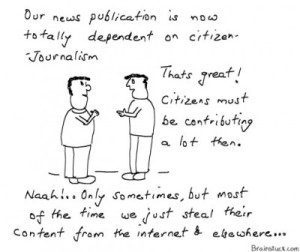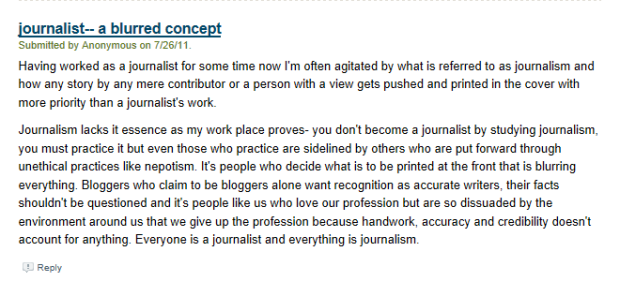romainbardet
This user hasn't shared any biographical information
Can anybody be a journalist?
Posted in Uncategorized on November 27, 2012
Who can be called a journalist? The answer isn’t so easy, but so important in a world where everything goes so fast and information has a great impact on human activities.
Today, almost anybody in the world has a smartphone and an access to the web. Anybody can post a picture, a text or a video and give a sort of information to the world. How? With the new media: Blogs, Facebook, Twitter, Wikipedia or YouTube. Information is so easy and so quickly widespread trough the planet. “Great evolution”, will say the ones. “Disinformation” will respond the others.

Will the professional journalists disappear?
Picture: macalester.edu
The raise of citizen journalism: the new world’s voice
People don’t want to stay silent. For many centuries, journalists have been people’s voices. They found, collected and verified the information and always searched for the truth. But with the Internet’s democratization, people don’t want to wait that the journalists let them speak. They prefer to raise their voice directly and explain or show something to the whole world.
With the advent of Internet 2.0, new media technologies, for example social networking and media-sharing websites, gave citizens the opportunity to give information. Those citizen journalists often report breaking news faster than “normal” journalists. We can cite the events of Arab Spring, which were a lot report by anonymous citizens in the heart of the revolution. Another example of this quick report and exchange of information is the “Occupy Wall Street” movement which debuted on September 17th 2011.

Syrian activists send information with their computer.
Picture: bbc.co.uk
A really actual example is Syrian crisis. The country is closed and inhospitable for the journalists. But Syrian people who live the war post videos and testimonies on YouTube, social media or blogs. They claim their story and give a reality that many journalists just can’t report. It benefits to the citizens in the world, to realize what’s happening there!
Chris Shaw, the editorial director of ITN, a Britannic production society, said to The Guardian that social networks were opening up “whole new vistas for documentary filmmakers. You can make the most amazing films using content from social networks, sometimes with the permission and sometimes without the permission of the people who shot them.”
This reality takes all its sense with the Syrian crisis. “There are places like Syria where journalists haven’t been able to go and […] there is an extraordinary resource on social networks for current affairs, even though we have to take extraordinary caution to verify what we use”, said Chris Shaw.
Let’s see a short funny video, but with interesting points of reflection. “No no, I’m the journalist!”:
Let people participate
What we can observe today, is that many classical media websites give people the possibility to react and deepen the information. You can let comments in the website’s blog for example. Professional journalists are not alone anymore, because readers give a feedback and let them know what they think about the article and more globally about the topic.
Other media are based on the concept that citizens can contribute to the news by giving information or sharing links, but with the control and the work of professional journalists behind. This is the case of Digital Journal or Rue89 in France for example. But is it citizen journalism? I don’t think so. We can call this hybrid journalism, because citizens and professional journalists work together.
 But some websites or blogs are entirely “citizen made”. You, I, anybody can add an article and participate to information’s transmission. But these platforms ask the contributors to share valuable and verified information, and grant themselves the right to remove an inappropriate content. For example, we can mention the Quebec’s website centpapiers or the better known Wikinews.
But some websites or blogs are entirely “citizen made”. You, I, anybody can add an article and participate to information’s transmission. But these platforms ask the contributors to share valuable and verified information, and grant themselves the right to remove an inappropriate content. For example, we can mention the Quebec’s website centpapiers or the better known Wikinews.
American information’s channel CNN launched in 2008 its new participative site: CNN iReport. This website is only based on citizens content. They can post a story, picture, commentary or video and create the news. What is interesting with this concept is that CNN’s journalists sometimes select a subject and diffuse it on the classic channels. With this system, citizens can really be a part of the media agenda setting.
Citizens, yes! Citizen journalists, no!
So where is the difference between a citizen and a professional journalist? Well, let’s go back to the very base of journalism: giving information. Information isn’t just a concept; it’s the reality, the truth, what’s really happening. Yes, journalism is “making information” and transmitting this information to the people; a full-time job!
Here are some answer people gave to the question “Who should be called a journalist?” on ijnet (international journalist’s network):



If we set aside the fact that professional journalists work for a media and are paid for this, we must consider that journalists respond to some exigencies and rules. They have to verify the sources, analyze them, explain the events, replace them in their context and be as objective as possible. And the journalists must respect deontological rules. Do the citizen journalists respect those exigencies? Because they must, instead we just can’t call them journalists.
Another point is that a professional journalist isn’t in the commentary when he writes an article. When a citizen journalist writes, we often observe committed comments. Professional journalist informs, when online citizen testifies to what he sees, ears or notices.
But today, citizens contribution is a wealth for journalists. An inexhaustible source of ideas and materials than can be used. And it forces journalists to do their job: treat information and not only transmit it as it is. Citizens make their citizen’s job, when they transmit something important and newsworthy to the journalists.
You’re a citizen, a journalist, or maybe a citizen journalist: what do you think? Leave you comments!
